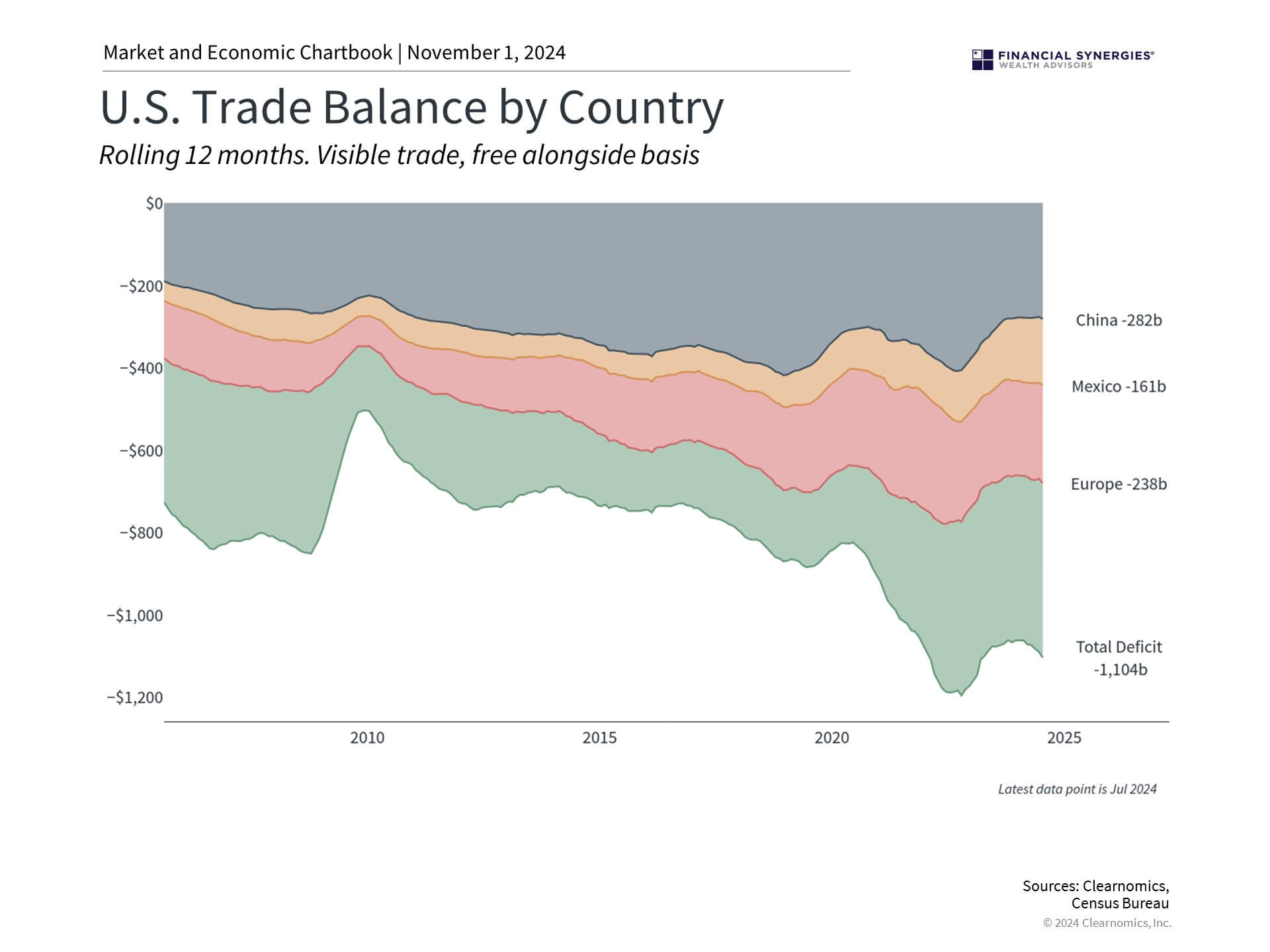- November 1, 2024
- Mike Minter

With just days to go until the presidential election on November 5, polls suggest it will be a close race between former President Donald Trump and Vice President Kamala Harris. Both candidates are campaigning hard in swing states, and investors may be worried about how either outcome might affect their portfolios.
Given the intense political divisions in recent years, it’s not surprising that emotions surrounding this election are running hot. In this environment, it’s important for investors to prevent politics from derailing their long-term financial plans.
As citizens, voters, and taxpayers, the result of this election could have important implications for our everyday lives. However, putting political preferences aside, this is not necessarily true when it comes to your portfolio. In fact, the markets and economy tend to impact the result of elections, and not the other way around. Thus, it’s important to vote at the ballot box and not with our hard-earned savings.
Tax policy is uncertain, especially relating to estate planning

Perhaps the most complex area when it comes to the outcome of the election is tax policy. The Tax Cuts and Jobs Act (TCJA) is set to expire at the end of 2025, leaving the future of individual and corporate taxes unclear and creating a so-called “tax cliff.” The candidates differ in their approaches to corporate taxes, individual rates, capital gains, tax credits, and more.
It’s important to maintain perspective around tax policy since these issues can be politically heated. While taxes have a direct impact on households and companies, they do not always have a straightforward effect on the overall economy and stock market. This is because taxes are only one of the factors that influence growth and returns, and there are many deductions, credits, and strategies that can reduce the statutory tax rate.
Taxes are also quite low by historical standards. This will be true whether the top marginal tax rate is 37% or 39.6%. With the growing federal debt, it’s prudent for investors to expect tax rates to eventually rise, whether they do so after this election or not. Planning for this possibility is only growing in importance.
One area where taxes are historically low is estate taxes, a tax imposed on the transfer of assets to heirs after death. The TCJA doubled the estate tax exemption amount, and after inflation adjustments, the level has risen to $13.6 million for 2024. Without additional action, this would revert to the pre-TCJA level, adjusted for inflation, which economists believe would be approximately $6.8 million per individual in 2026.
Although estate taxes constitute only a small portion of government revenue, and the percentage of people who are subject to estate tax is small, this has become a challenging political issue. The future of estate taxes will very much depend on the results of this election, including the results of Congressional races. For many wealthier households, this could have a significant impact on tax and estate planning.
Global trade and tariffs will depend on the election

The candidates also differ on their potential trade policies, especially when it comes to tariffs. While the wave of deglobalization and the reshoring of manufacturing is likely to continue, how tariffs are used to increase U.S. competitiveness and generate revenue could depend on the outcome of the election. That said, President Trump’s administration enacted a number of tariffs during his time in office, most of which were continued by the Biden administration.
Tariffs were once a major factor in trade and a significant source of revenue for the U.S. government, but in recent decades they’ve played a small role. Over the past century, the formation of organizations and agreements – such as the WTO, NAFTA, the USMCA, and others – helped to ease trade barriers across major partners. Still, the use of tariffs to protect domestic industries and intellectual property, including steel, electronics, semiconductors, agricultural goods, and more, have occurred periodically.
For investors nervous about a possible trade war, it’s important to note that the same fears in 2018 and 2019 did not lead to the worst-case scenarios that some predicted. The economy remained strong during this period, with unemployment near historic lows and inflation non-existent, even though it was quite late in the business cycle. Eventually, ongoing negotiations between key trading partners helped to mitigate some fears. As the accompanying chart shows, throughout different trade regimes, the U.S. has maintained a trade deficit with many countries.
The economy has grown under both major parties

When it comes down to it, history shows that the economy has grown under both political parties and bull markets have occurred regardless of who occupied the White House. Although it may seem counterintuitive, this is because politics often has a small impact on the economy and markets. Specifically, the business cycle and broad trends such as the growth of artificial intelligence and technology advancements, falling inflation, and the strong job market matter far more.
Despite the perceived importance of this election, policy changes also tend to be gradual due to checks and balances in our political system. What candidates promise on the campaign trail can differ from what they can actually enact.
When it comes to taxes, neither candidate is proposing a return to pre-Reagan era tax levels when the top marginal rates reached as high as 94%. When it comes to trade, tariffs may increase but they are unlikely to reach the levels experienced almost a century ago during the Great Depression. It’s important to keep these facts in perspective when planning for the next four years.
The election matters for many reasons, but its long-term impact on the stock market and economy is often overestimated. The economy has grown under Democrats and Republicans alike, and it’s important to maintain this perspective heading into the election.
Concerns or questions about how your investment portfolio will hold up in the current market environment? Contact Financial Synergies today.
We are a boutique, financial advisory and total wealth management firm with over 35 years helping clients navigate turbulent markets. To learn more about our approach to investment management please reach out to us. One of our seasoned advisors would be happy to help you build a custom financial plan to help ensure you accomplish your financial goals and objectives. Schedule a conversation with us today.
More relevant articles by Financial Synergies:
- Chart of the Month: Investing Based on Politics is a Bad Idea
- Your Cash Options With Financial Synergies
- Chart of the Month: Market Volatility is the Price of Admission for Investing
Blog Disclosures
This content, which may contain security-related opinions and/or information, is provided for informational purposes only and should not be relied upon in any manner as professional advice, or an endorsement of any practices, products or services. There can be no guarantees or assurances that the views expressed here will be applicable for any particular facts or circumstances, and should not be relied upon in any manner. You should consult your own financial advisors as to legal, business, tax, and other related matters concerning any investment.
The commentary in this “post” (including any related blogs, videos, and social media) reflects the personal opinions, viewpoints, and analyses of the Financial Synergies Wealth Advisors, Inc. employees providing such comments, and should not be regarded as the views of Financial Synergies Wealth Advisors, Inc. or its respective affiliates or as a description of advisory services provided by Financial Synergies Wealth Advisors, Inc. or performance returns of any Financial Synergies Wealth Advisors, Inc. client.
Any opinions expressed herein do not constitute or imply endorsement, sponsorship, or recommendation by Financial Synergies Wealth Advisors, Inc. or its employees. The views reflected in the commentary are subject to change at any time without notice.
Nothing on this website or Blog constitutes investment or financial planning advice, performance data or any recommendation that any particular security, portfolio of securities, transaction or investment strategy is suitable for any specific person. It also should not be construed as an offer soliciting the purchase or sale of any security mentioned. Nor should it be construed as an offer to provide investment advisory services by Financial Synergies Wealth Advisors, Inc.
Any mention of a particular security and related performance data is not a recommendation to buy or sell that security. Financial Synergies Wealth Advisors, Inc. manages its clients’ accounts using a variety of investment techniques and strategies, which are not necessarily discussed in the commentary. Investments in securities involve the risk of loss. Past performance is no guarantee of future results.
Any charts provided here or on any related Financial Synergies Wealth Advisors, Inc. personnel content outlets are for informational purposes only, and should also not be relied upon when making any investment decision. Any indices referenced for comparison are unmanaged and cannot be invested into directly. As always please remember investing involves risk and possible loss of principal capital; please seek advice from a licensed professional. Any projections, estimates, forecasts, targets, prospects and/or opinions expressed in these materials are subject to change without notice and may differ or be contrary to opinions expressed by others. Information in charts have been obtained from third-party sources and data, and may include those from portfolio securities of funds managed by Financial Synergies Wealth Advisors, Inc. While taken from sources believed to be reliable, Financial Synergies Wealth Advisors, Inc. has not independently verified such information and makes no representations about the enduring accuracy of the information or its appropriateness for a given situation. All content speaks only as of the date indicated.
Financial Synergies Wealth Advisors, Inc. is a registered investment adviser. Advisory services are only offered to clients or prospective clients where Financial Synergies Wealth Advisors, Inc. and its representatives are properly licensed or exempt from licensure. Investments in securities involve the risk of loss. Past performance is no guarantee of future results.




